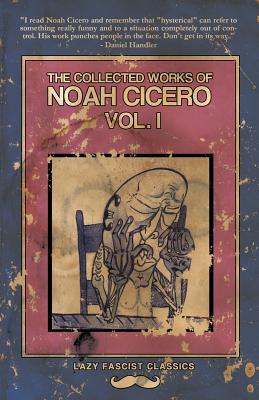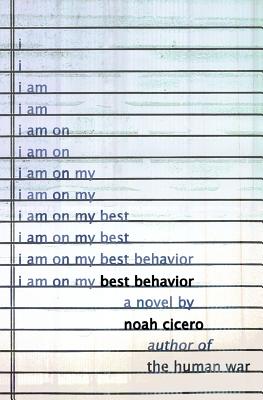
With pared-down prose and a sense of clarity that would knock a pulp-thriller writer off his feet, Noah Cicero’s descriptions of life in faded industrial cities and their outskirts have stood as some of the most searing fictional works in recent memory. It takes a lot of work to sound this effortless — at its best, Cicero’s fiction sears, featuring stunted lives, frustrated pursuits, and cities that leave their residents eternally stifled. Earlier this year, Lazy Fascist released The Collected Works of Noah Cicero, Vol.1, which brings together several of his previously-released works. This is what led Tobias Carroll and R. Stephen Shodin to spend a couple of weeks discussing Cicero’s work — in particular, the new collection — and figure out what it all means: Youngstown, geographic representations, portraits of class in fiction — everything, pretty much.
Tobias Carroll: So — as we begin this discussion of Noah Cicero’s writing, I’m going to kick things off by talking about The Condemned. It was my first experience reading Cicero’s work, and it’s interesting to see it in a wider context here. It’s the longest individual work in Collected Works, Vol.1 — even though its structure is more based around individual plotlines rather that one overarching narrative. I’m curious: what was your first exposure to Cicero’s fiction? And how did you feel about how that was presented here?
R. Stephen Shodin: I started reading Cicero’s blog in 2007, maybe 2006. I can’t recall for sure, but I do remember the first story of his I read. It was “Gina Bad Ass.” I was already a fan of his manner/tone via the blog, but that story really brought it all home for me. I had been Tod at some point in my life. Or at least I felt like I had. And I knew ladies that were like Gina.
As for The Condemned, that was the first book of his I bought and it’s great to see it in a collection. It’s a great set of short stories that stands on its own, but its brevity can be really jarring. A great artist of any stripe will always leave you wanting a little more. When I read The Condemned for the first time I finished it in one sitting and I not only wanted more, but was angry that I didn’t have any more. Some of Cicero’s early books are really novellas, and might even be microvellas. His sente-graphs are packed with a ton of emotion and no bullshit. It’s not your typical “Literature”. There are no long, flowery sentences. There are no MFA-approved opening paragraphs. What I’m getting at here is that I think this collection is the perfect way to package all of these short bursts together in a very satisfying way. For instance, I think The Human War stands on its own, but within the context of the other works it becomes a piece of a much larger picture of suffering in the Rust Belt.
TC: I agree completely about the atypical qualities of Cicero’s work. After reading this collection, I find myself wanting to recommend him, though I’m unsure whose work I’d compare him to. Hubert Selby, Jr., maybe, though Cicero is brutalist where Selby is baroque. Scott McClanahan also comes to mind — not just via the “Lazy Fascist has released collections of work from both” factor. (Though McClanahan also seems to be playing with form and veracity a bit more.)
As someone who’s from northeastern Ohio, I’m curious about how you react to Cicero’s portrayal of the area. Is he going for straight-up realism, or something more stylized?

RSS: I recommend Cicero quite often. Usually to people that strike me as having the same kind of stink on them that I do. Specifically, people that gravitate to the brutal and baroque aspects of the lower classes. People that have a certain far away look in their eyes. Or blow-hard asshole types that talk about how Literature is dead and everything sucks. Cicero isn’t really for everyone, but I want him to be. I also feel that way about Henry Rollins, Hubert Selby, Jr., Jerry Stahl, Lydia Lunch, Jim Carroll, etc. Cicero fits in well with that posse of writers. He’s doing his own thing, but it’s also a part of something greater and far larger than that.
That’s difficult to answer because there’s a level of stylized and very real seediness in the Youngstown area. Corruption, crime, and mob activity have been the norm there since the 70s (and likely before that). Rampant unemployment, drug abuse, depression, murder- all of these things exist there in a very real way. It’s also a place that is always “coming back” and “improving”. Cicero does a good job of portraying that dichotomy. His characters are as real to me as some of the people I used to know there. Not all of the people, mind you, just some.
The other aspect of everything I mentioned above is that there are certain folks that simply embrace all of the crushingly depressing facets of that area and wear them like a badge of honor. For instance, a few years ago my mom gave me a black t-shirt with a picture of an AK-47 on it, and the words: Youngstown, Ohio 2 TIME DEFENDING CHAMP “MURDER CAPITAL OF AMERICA” 2001-2002 “COME HEAVY, OR DON’T COME AT ALL”. I wear that shirt as a sardonic joke, but if anyone asks me about it, I will tell them that what it’s saying is also very real. Some people from that area embrace a very black humor about all of the violence and death. It’s one way of dealing with something that is just too fucked up to fully process. I imagine this brand of black humor/self-deprecation is somewhat similar to New Jersey’s red-headed stepchild to New York status.
As an unabashed Jersey guy, do you identify with the characters Cicero presents, and in what ways?

TC: I feel as though I can identify with Cicero’s characters — though to some extent, that’s in the broader sense of being able to identify with any character presented with empathy. And I think, for all of the harshness in Cicero’s fiction, there’s also plenty of empathy — both for his narrators and for the occasionally shocking characters that they meet. No one in this book is a cartoon. He writes barely sublimated anger incredibly well, and frustration — and that sense of being the only person in your town who gets a certain type of lit, or art, or music.
And: definitely, with respect to Jersey and its relationship to New York. I don’t feel quite as qualified to talk about that as much now — it’s been a while since I last lived in New Jersey, and I feel like there have been enough things to shift the NY/NJ relationship from the status I remember. (The effects of Sandy would be first among them, but also things like Bruce Springsteen’s ascendancy to folk hero status.) On the other hand, people haven’t forgotten about Jersey Shore, so…who knows.
Also, for all that Cicero’s stories focus on Youngstown, he also has a knack for getting his characters to other places at times — I feel like trips to Mexico occur in more than one of these stories. I seem to remember reading that Cicero had been working overseas recently — South Korea, I think? — and I’m wondering if this will also work its way into his fiction. Which, I guess, begs the question: where do you see his work going from here? You can definitely see his style being refined over the course of the work collected in this edition…
RSS: Salient points as always, sir. Cicero has a great amount of empathy for his characters, and I’d venture to guess, with real people as well. A person doesn’t write like that and not have some very serious and (likely) conflicting feelings about him/herself as well as the rest of humanity. I think he captures that anger and frustration so well because it’s a part of him and he’s not afraid to admit it or put it on display.
Right, and to be clear, I haven’t lived in the Youngstown area for well over a decade now so I don’t feel 100% comfortable talking about “the way it is” there, but I did live there for a very large chunk of my life and I saw the same kinds of wrongs and devastation that Cicero captures so well. That said, I still hear a lot about how the area is changing for the good and there are a good number of people that have decided to raise their families there, etc. What I’m getting at is that it’s not such a bad place. For instance, there are large parts of Central and South America that make Youngstown look like paradise. See, there’s some of that black humor I was talking about. Anyway, much like many people haven’t forgotten about Jersey Shore, there are still a good number of folks that haven’t forgotten about the mob related activity and corruption in Youngstown. And there are people like Cicero who haven’t forgotten how important it is to tell the stories of people that aren’t sipping martinis at the opera.
Yes, these are not all stories about Youngstown. These are stories about real people: lower class people. We have a really distorted sense of class in this country. There are a lot more people that are poor than we’d like to believe. Cicero is keenly aware of The U.S.A.’s class structure. He has his fists wrapped firmly around the pulse of what it means to be working poor in this country because in a many ways he is very similar to his characters. He’s worked a lot of these “blue collar” jobs and had to struggle with coming up with the rent and figuring out how to make ends kind of meet. That said, he’s done some things that his characters have not: like teaching ESL in South Korea, which I hope will work itself into his writing.
Yes, for sure. Like anything else, with a lot of practice one tends to improve. I’ve talked to people about Cicero and they have said things like “he’s not technically that great” or “there are a lot of typos”. Blah. Those are issues for Literary snobs. I do think Cicero would benefit from a long-term relationship with an editor that understands and respects his voice. I’d really like to see that happen. This collection feel like a move in that direction. It’s the best presentation of his writing so far and it has me excited about what might be next. I’m not clear on where his work will go from here, or if it will go anywhere that’s “conventionally successful”. I don’t think it matters. His writing has affected my life so I think of him as a successful writer. I wish success like that paid the rent. I really do. I don’t know what he’ll do next, but I do know that I’ll be very excited to read it.
TC: Count me in in the camp of hoping that Cicero’s experiences in South Korea make their way into his fiction before too long. In this interview at Word Riot, Cicero said that the first Collected Works would be one of five books that Lazy Fascist would be releasing over the next few years. He also wrote about planning to write more nonfiction, including “a book of essays like Walden or Desert Solitaire, called Grand Canyon.” And he talked about opening a microbrewery.
I’d certainly buy a beer from him, but I hope we haven’t seen the last of his fiction, either.
Any other closing thoughts?
RSS: I’m really pleased to hear that Cicero will be releasing more work through Lazy Fascist. Like I said before, they have put together the best presentation of his work. I hope that relationship continues to grow. I’m very excited to see what they do next. I saw a Facebook post from Cicero a while back mentioning his idea for a book of essays relating to his time in Arizona. My first thought was: I would read that. No matter what he decides to do or not do, the guy has generated a sizable amount of material so far and I’ve seen improvements in each new thing so I am hoping that he will continue to write no matter the form.
I’d buy a beer from him too, but I’d rather by a book (or two) from him. Don’t get me wrong, I love a good beer, but books last longer than beers and Cicero has more to offer the world than a hangover.
Follow Vol. 1 Brooklyn on Twitter, Facebook, Google +, our Tumblr, and sign up for our mailing list.
